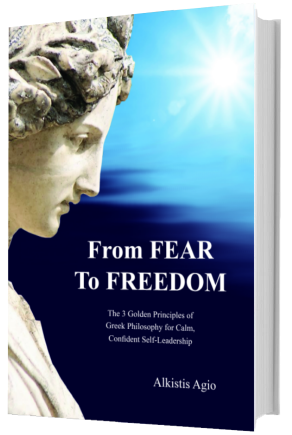Modern Stoic Alkistis Agio reveals how ancient Socratic thought can powerfully help us deal with today’s greatest problems.
By Alkistis Agio
Today, we colloquially use the term ‘stoic’ to describe someone who remains calm under pressure and avoids emotional extremes. Stoicism is an ancient Greek philosophy, developed by Zeno, who was inspired by the teachings of Socrates. It was later adopted by the Romans.
Today there is a movement called the Modern Stoicism. Stoicism is a valuable “operating system” for life. It offers a solution for modern people, who want to have a “moral compass” based on humanist values & principles, without the need for religion or priests. It’s the original ’self-help’ philosophy.
Stoicism centres around relentlessly focusing on what you can control and ignoring what you can’t. This seems simple & straightforward— and that’s because it is. It’s not ground-breaking. It’s not complex. It’s clear and simple- so anyone can practice it.
As Epictetus taught over two thousand years ago: “Just keep in mind — the more we value things outside our control, the less control we have.”
Stoics are grown-ups. We are realists. We focus on what we can affect, which are mainly our own thoughts & actions. Stoicism gives us back the power, offering equanimity & inner peace in the face of life’s highs and lows.
How can we apply Stoicism to today’s world, and help us counter some of our everyday challenges, like the COVID threat or economic problems? The ancient Stoics prided themselves on being rational, objective thinkers. They believed that humanity’s greatest asset is a functional mind, and to exercise reason is the most virtuous pursuit. Stoics didn’t believe in gods, mysticism, or magic.
You might ask, where does love fit into this equation? Stoics believe that if we all thought more rationally, there would be more love, peace & justice for all. In fact long before Jesus Christ taught about love, the Greek philosophers taught us that we should treat others as we would like to be treated. Why? Because it makes sense: we all benefit when we don’t behave irrationally or egotistically.
Regarding Fear, Epictetus taught that “Men are disturbed, not by things, but by the view which they take of them.” Like all other emotions, Stoics consider fear as a subjective judgement. It’s not a true, objective representation of the external environment- rather, it is a personal evaluation of external circumstances.
So, what lessons can the Stoics teach us to counter fear? For example, with regards to the Corona Virus pandemic.
First: Knowledge is power. (especially scientific facts) With COVID-19, it means understanding things like how the virus spreads, what the symptomatic range is, and how simple measures like social distancing and handwashing can dramatically alter the impact of the virus on a population.
Second: Do not Dramatise things. Describe things as objectively as you can. Stick to the facts. When we remove the heavy load of our emotional judgments, it improves our ability to deal with our circumstances like mature adults.
Third: Let go of trying to control external circumstances. This means doing everything that is under your control to not fall sick, and then willingly accepting the consequences if you do.
About Illness Marcus Aurelius taught… “If it is endurable, then endure it. Stop complaining.”
In other words: “Keep calm and suck it up”. Complaining or talking about your illness will not do anything. It won’t change your circumstances, and it won’t make you feel any better. If anything, you will feel a vicious cycle of self-pity, frustration, and anger.
How do the Stoics easily accept illness?
We practice the Cognitive Distance “Ataraxia”. Ataraxia is a Greek word that means to be ‘unshakable’. Essentially, it means we Stoics create separation between our mind and our ailments by dis-association: Instead of saying “I am sick” we say, “My body is sick.”
It’s a subtle difference, but it significantly changes how we view our illness and its impact on our quality of life. By doing so, we maintain a functioning, rational mind without succumbing to the “noise” of our physical health.
We Stoics also meditate on our Death every day. “Memento Mori” is the Stoic practice of meditating on the inevitability of our death and the transience of our life.
This may sound like a depressing idea. But ‘Memento Mori’ actually helps us to live in the here and now, as Marcus Aurelius taught: “Be happy for this moment. This moment is your life.” Of course, this is all much easier said than done. It requires ‘prosoche’, the Greek word for ‘Mindfulness’. The result is inner peace and harmony and isn’t that what we all really want?
For more information and to download a free summary of my book, “From Fear To Freedom” click on my website: www.alkistis.net






